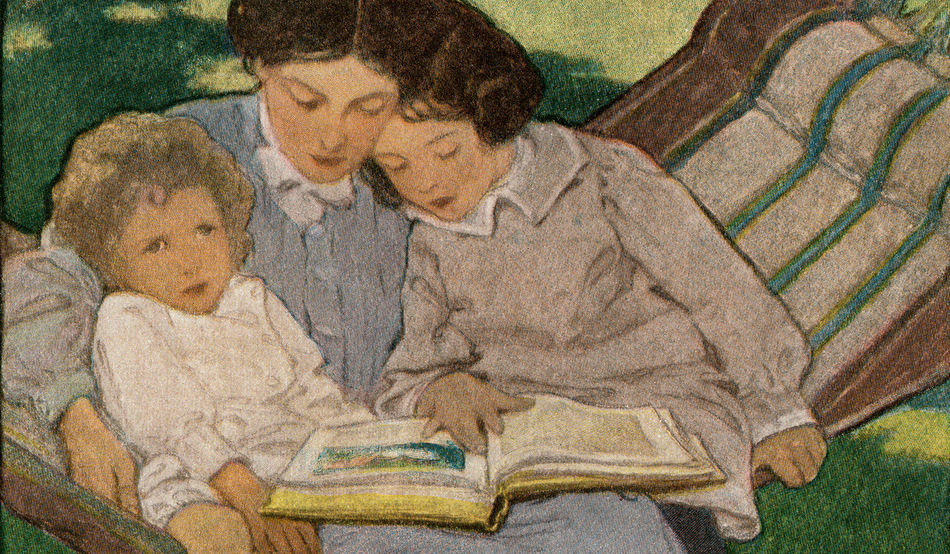The other night my six-year-old launched herself out of bed mid-sentence, arms flailing like a windmill. “Like this? Is this how he did it?” She was recreating Grandpa Joe’s jubilant dance after Charlie finds the golden ticket. A minute earlier, we’d been in our pyjamas, deep inside Charlie and the Chocolate Factory. Now we were half in Roald Dahl’s world and half in our own, acting out the story at full volume.
This is what happens when I read to my children. They can’t stay still. They have to become the character—whether it’s Grandpa Joe jigging or Dr Dolittle huffing in his spectacles. Bedtime becomes a cross between theatre rehearsal and riot.
When I tell you I’m addicted to reading to my children you may, reasonably, want to retch. Oh, please. Another sanctimonious lecture on parenting? Spare us. But this is not a sermon, nor a defence of the measurable benefits that reading aloud has for kids. I don’t know much about that and—frankly—I don’t want to.
I mean it: I am addicted. Where other mums reach for a glass of wine, I reach for a book. It is nothing to do with duty. It is, first, about escaping the horrors—fatigue, boredom, low-level despair—of the daily endurance test we call parenting. And second, about radical, transformative joy. Reading is great, but reading to my kids is life-saving and intoxicating.
Why? The philosopher in me can’t help wanting to try a theory on for size. Let’s call it transcendence through empathy—or, if you prefer, shared consciousness. Ordinary consciousness is lonely. No one else can think your thoughts or live your fate. Part of the thrill of being inside a story with your listeners is the sudden experience of inhabiting—simultaneously, intensely, effortlessly—one consciousness: that of the narrated character. Their thoughts and feelings become ours; their journey, our journey. The lonely edge of consciousness falls away as we are absorbed together into another self, held in a kind of collective trance. Out of many, we are made one.
This unity isn’t abstract for my kids. It’s visceral. They feel it in their bodies. They can’t keep still; they leap up to try the gestures, voices, movements. It’s empathy made physical—an irrepressible urge to inhabit the other. “Wait, wait, wait!” my six-year-old cries, ready to fly off the bed as Peter Pan. My older two act out the shrugs, scowls and eye-rolls of Ron, Harry and Hermione, determined to get them just right.
Normally, consciousness is scattered. We dart from one thought or feeling to the next. A character’s consciousness, by contrast, has shape—a unity, coherence—we rarely achieve in our own lives. So, it’s not just that we come together miraculously inside the character; the experience of the character itself is unifying, leaving ordinary awareness feeling like a pale second-best.
Little wonder, then, that stopping is so hard. “Just one more page!” “Just one more line!” Bedtime slips later and later. Occasionally, the children resist starting because they know that once they are in the story, leaving will hurt. It’s an addiction, fiercer than that to scrolling.
That I enjoy the performance helps, too: the voices, the pregnant pause, the whispered aside. My children sometimes clap at the end. That’s nice, but I’m just a conduit. The point is where we’ve been—inside another world, where the boundaries of our lives dissolve and possibility stretches. A place where our selves grow larger, where homework and dirty dishes vanish. A suspended, expanded present.
And yet there is something ancient in this, too. For most of human history—before mass literacy—a story was what we heard together: around a fire, in the company of a teller. It was about entering this suspended state together through the music of language, rhythm and sound. Reading aloud renews that experience.
And then there’s the crying. Not theirs—mine. Aristotle would have called it catharsis. Just as he believed it was therapeutic for audiences to purge strong emotions in the structured, low-stakes environment of the theatre, so experiencing intense feeling with my kids—free from the ever looming threat of interpersonal strife—is bonding, healing and regulating all at once. As a parent, I often repress. As a storyteller, I can let the feelings flow, confident the story will keep the peace among us. And so I often sob through the final pages—a joy and a relief. I can’t help myself and, thanks to the parallel universe provided by the book, I don’t have to.
You could say that the imaginative leap into another’s shoes is practice for the moral life, civilisation in miniature. But I’ll save that for another column.
As my professional life keeps me knee-deep in democratic collapse, climate breakdown and other crises, the joy of reading aloud feels less like a luxury and more like a necessity. Not only is it pure magic, it’s cheaper than wine.













